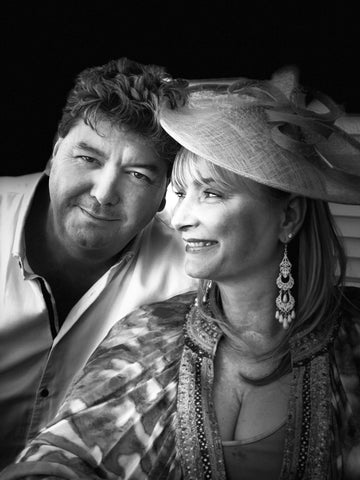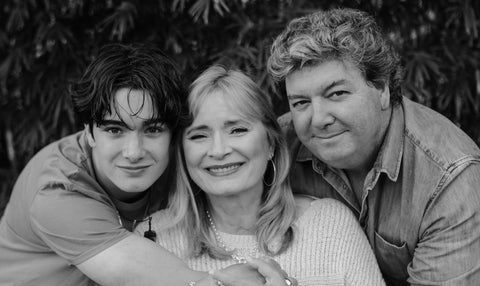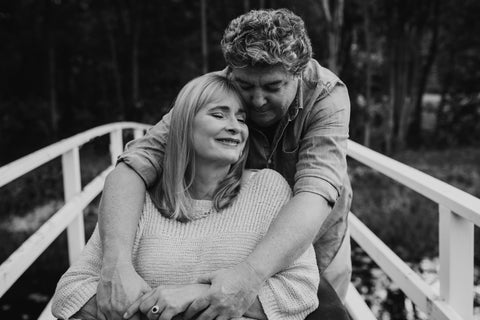Sex, love and rocking the roll
An intimate chat with Carol Taylor, Co-Owner and Lead Designer at Christina Stephens.
Sex happens. Everyone does it in one way or another. Society is embracing it more than ever and we’ve started to break down the barriers to discussing it openly.
But sex when you have a disability?
Not so much.
Carol and one of our very good friends at Christina Stephens, who are both highly educated, intelligent women, fantastic speakers and both have so many feathers in their (very fashionable) caps, are constantly asked - “Can you still have sex?”
Really?! In 2023, we’re still getting this? You’ve got an opportunity to speak to these incredible women, and that’s what you want to ask?
We hear so many stories where big assumptions have been made and ignorance is rife.
It’s a big reason why Jessie started Christina Stephens - to give people with disability the choice to wear what they want and feel sexy and glamorous and confident.
So here we are, deep diving with Carol on all things sex, intimacy and love, post-spinal cord injury, in a bid to dispel some of that mystique and change disability stereotypes.
Starting at the start: Foreplay
Let me set the scene for you…
It’s a virtual interview. I’m logging on from Melbourne, Carol is logging on from the Gold Coast. We’ve had to shuffle this Zoom a few times already, but the day has arrived, and although we both work very closely together, we’re both feeling a bit nervous.
But in classic Carol style, she reads the room immediately and busts out with:
“I told Rob I was going to do a sex interview and he said “oh well that’ll take all of three minutes.””
And so we begin with giggly gusto.
Carol starts by explaining that sometimes sex takes a bit of a backseat to life. (Ahhh, yep! We hear you!) That when you’re at the peak of your career, and you’re in full throttle parenting mode to a teenager, and pre-menopausal… your sex life can be a bit… lacking.
“Foreplay for me sometimes is “Are you awake?”,” Carol chuckles.
“It’s hard to try to juggle everything. Literally. Then there’s a lot of added complications with a spinal cord injury.”
“Forget about tools and toys… The most valuable thing to bring to the bedroom after a spinal cord injury is a good sense of humour.”
Sex Ed, but not like you know it
The year is 2001, Carol is lying in a hospital bed, trying to comprehend life as a complete C5/C6 quadriplegic. Then in walks a nurse quite senior in years, to give Carol some clinical advice on how to do it.
“You just need a prodigious amount of pillows.”
No explanation, no demonstration. Just lots of damn pillows. 22 years on, Carol is still scratching her head wondering what to do with her prodigious amount of pillows!

Carol was delighted to learn that there would soon be sex workshop in the common room where some of these questions might hopefully be answered. Carol wheeled off to the workshop full of anticipation and questions only to discover that she was the only female in the room and none of the “equipment” displayed by the nurse applied to her. Carol mentioned her disappointment to one of the nurses. Not long after, a very stoic woman, the head of the Spinal Unit, paid Carol an unexpected visit and offered the following advice: “Carol, an orgasim begins and ends in the mind.”
That was it! The two clinically-advised, secrets to sex as a quadriplegic. (And not even good sex. Just sex.) That was the sum total of Carol’s sex ed at the spinal unit.
Carol’s first time - warning, you may spit your cuppa out…
Everybody will have a different experience having sex for the first time post-injury. For Carol and her husband Rob, they waited 5 months and were both incredibly nervous, despite being together for years.
But neither of them had any inkling it would turn out the way it did…
“A comedy of errors and circumstances made it a very memorable occasion,” Carol begins, with a saucy glint in her eyes.
“My secretary at the time needed a place to stay, while she was studying for exams. So I said she could stay in a spare room at the back of our house. Unbeknown to us at the front of the house, there was a big party going on at the neighbours behind us. Carol’s secretary was trying to study for upcoming exams and couldn’t because of all this noise. So what did she do? What any determined student would do of course - she called the cops to complain!
“Rob and I are trying to get in the groove, trying to remember what to do, and work out what the hell we were going to do with this prodigious quantity of pillows. We were trying to get past all the awkwardness and shyness, and were just starting to get back in the saddle when all of a sudden, a bright torch shone straight in the bedroom window!
“I was like “holy crap! Someone’s trying to break in!” Rob goes flying out of the bedroom in his boxers to the front door, opens the door, only to be greeted by two cops! All three men got more than they bargained for! I could hear the conversation from the bedroom and burst into a complete fit of giggles!
“When questioned by a more than irritated Rob the cops said they’d had a noise complaint, and they don’t usually knock on the door because they want to nab perpetrators in the act!”
Well they certainly managed to do that!
Why Carol takes a blood pressure monitor to bed
Carol has a beautiful way of explaining the unexplainable differences of individual spinal cord injuries (SCI). She likens SCI to a fingerprint - it’s unique to everybody. Even though her injury is at the C5/C6 level, she can talk to another quadriplegic at the same level and they can have completely different experiences of SCI.
“I describe myself a bit like a sausage roll. My skin is the pastry, and I can’t feel that, from just below the chest, but I can feel inside,” Carol says.
“I’ve always suffered chronic period pain, and after my injury I saw a doctor in Sydney who almost didn’t believe me when I told him this. It was at that point I knew God was a man! - how else could I be paralysed and still get period pain?”
But that feeling from the inside, did have an up-side. When Carol was pregnant with their son D’arcy, she could feel him moving.
“I would get tingles all through my body, especially my face. It was like firecrackers going off inside. It was beautiful, and wonderful. I would always know when he was on the move, I could then watch my tummy and see him move.”

This lack of external sensation for people with a spinal cord injury, means they can be prone to suffer something called autonomic dysreflexia. A really nasty term, meaning her blood pressure reacts to stimulus.
“If I felt pain, my blood pressure would suddenly shoot up. But the reverse is also true - if I’m overstimulated, my blood pressure can peak. And it can go very high very quickly, and that can be very dangerous. It's a bit of a balancing act.
“You think about the toys some couples bring to bed. And I’m there rocking it with my heart monitor!”
Intimacy, love, and support
The first time Carol blushes in this interview, like really blushes, is when we talk about her husband Rob, and the incredible connection they continue to have.
“Rob’s definitely the romantic out of the two of us. We’ve got a peach tree that’s in full blossom, and he picked a branch off and put it in a vase and put it on my desk, just last week.
“He’s always leaving me flowers, or cards, or little notes. But honestly, just spending time together, and making time for each other away from all the chaos. That’s the stuff that really matters.”

Carol says you come to realise the importance of intimacy and affection, which are always important in any relationship, but become crucial post-accident.
“Initially I didn’t want any romance. I just thought my life was at an end. I didn’t realise that there was so much more life left in me, and left in us as a couple.
“It was a real deep time of love for Rob and I. We are incredibly in love as a couple. I’m very lucky in that regard, because I know that there’s a very high divorce rate among couples who experience spinal cord injury.
“I’ve made many mistakes in my life, but the one thing I knew how to do well was pick a good man. I definitely picked a good one and we will celebrate 25 years of wedded bliss this September!”
Carol’s advice to other SCI survivors
“I would say to give it time. I hate to use the cliche “new normal” but you do create a new normal. Try not to be hard on yourself, be patient and be patient with your partner.
“It’s a team effort. You will find your groove. You’ll get back in the saddle. You mightn’t be able to swing from the chandeliers like you used to, but bring a good sense of humour, ditch the prodigious pillows, and you’ll find your new way.
“Orgasim is still possible. It’s different, but it’s still wonderful. Show each other love and patience, and lots of intimacy, and you will create a new normal. Everything will be fine.”
























